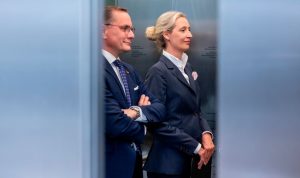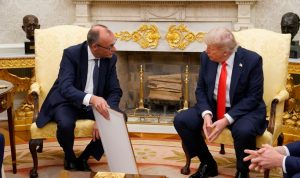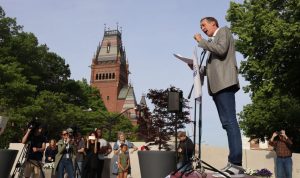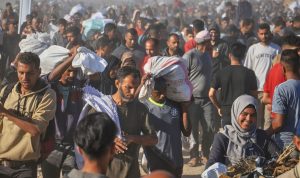In the conflict with U.S. President Donald Trump over Greenland, Danish Prime Minister Mette Frederiksen, 47, has a lot to lose. Two days prior to her interview with DER SPIEGEL, the Social Democratic prime minister held a speech on Europe in Danish parliament and shortly thereafter published an open letter together with Italian Prime Minister Giorgia Meloni in which they sharply criticized the European Court of Human Rights. Getting to her requires passing through four security doors. Frederiksen is waiting at a conference table in her office, and she is quick to interpret her guests’ sweeping glances through the expansive space. "Like in the Netflix series 'Borgen,’ yes.” She clearly has no interest in small talk.
DER SPIEGEL:Ms. Prime Minister, it has been about five months since U.S. President Donald Trump again declared that he was interested in buying Greenland. At what point did you realize that he wasn’t joking?
Frederiksen:I was convinced early on that Trump was serious. But we are serious, too. For me, it is clear – and this is enshrined in our laws – that the future of Greenland will be decided by the people there. It is their land. According to the UN Charter, international law, and everything upon which we have built our world order since the end of World War II, you cannot simply claim part of another country or take it by force. Our Kingdom of Denmark is a community, and it includes Greenland. That is the reality.
The article you are reading originally appeared in German in issue 23/2025 (May 31st, 2025) of DER SPIEGEL.
DER SPIEGEL:Trump seems not much to care.
Frederiksen:Many people around the world are wondering whether we are entering a new era. The more I think about it, the clearer it becomes to me that we are. I was born in 1977. My political awakening began with Nelson Mandela and his fight for freedom. At the age of 12, I was a member of the African National Congress (ANC) youth group that supported him. Looking back, the three-and-a-half decades since the fall of the Berlin Wall were almost a golden era – despite the wars in Yugoslavia, terrorism, and all the other crises. That era is over. We are at the beginning of a new age, one that is more uncertain and, therefore, more dangerous.
DER SPIEGEL:What other factors make you believe this?
Frederiksen:Russia is very aggressive. I am convinced that Vladimir Putin and his allies want to continue what we have been witnessing in Ukraine since 2022. They have restructured their economy for a prolonged war and are being supported by North Korea, Iran and, unfortunately, also by China.
DER SPIEGEL:In April, during a visit to Greenland, you said that the Danes have always regarded the United States as a partner. How do you view the U.S. today? As an ally or as an adversary?
Frederiksen:I hold on to my values. Even if things are changing in the U.S., that does not alter my view of trans-Atlantic relations. Without NATO, we would not be able to protect our population. Article 5 of the North Atlantic Treaty, the collective defense clause, is our most important insurance policy.
DER SPIEGEL:It is questionable how long the mutual defense clause will remain valid.
Frederiksen:You can accuse me of many things, but not of being naïve. I see our weaknesses. It was a historic mistake for Germany and Europe to buy gas from Russia and make itself dependent. We Europeans have paid a price for that. Today, we must clearly recognize the new reality. We will have to reconsider our decisions. I hope that everyone remains committed to NATO. But Europe must become capable of fully defending itself.
DER SPIEGEL:It has been reported that the Americans have already begun calculating internally how much it would cost each year to take over Greenland. Denmark currently supports the island with the equivalent of $650 million per year. The U.S. might be willing to spend significantly more. According to reports in the American media, they are apparently looking for potential informants among the local population. What preparations are you making?
Frederiksen:I can imagine many things, but I prefer not to share scenarios with you. The people of Greenland and their government have made their position clear: Greenland’s future can only be decided in Nuuk, the capital. I expect everyone to respect that – including us.
DER SPIEGEL:The people of Nuuk are deeply concerned. One parliamentarian, for example, said she is worried that U.S. soldiers might land at night by plane, patrol the streets in military vehicles and dissolve the parliament.
Frederiksen, Greenland's newly elected premier Nielsen and his predecessor Egede: "The people of Greenland and their government have made their position clear."
A protest in front of the U.S. Consulate in Greenland's capital city of Nuuk in March.
Christian Klindt Soelbeck / AFP
Frederiksen:I generally do not engage in speculation. Instead, I focus on what is actually happening.
DER SPIEGEL:Your tone has become more urgent in recent months. During your last visit to Greenland, you addressed the American public directly in English.
Frederiksen:I always say clearly what I think and what I want. We must try to de-escalate the situation. Conflicts between allies are not a good idea. What are we witnessing globally? An aggressive Russia that not only attacks Ukraine but also confronts us with hybrid attacks, cyberattacks, and disinformation. Then there is the situation in the Middle East, the ongoing threat of terrorism, and climate change. At such a time, we should not have conflicts between Europe and the U.S.
DER SPIEGEL:You recently delivered an historic keynote speech on Europe’s future in Danish parliament. You referred to former French Foreign Minister Robert Schuman, who supposedly rewrote his speech on the founding of the European Community nine times to find the right tone. How often do you adjust your messages?
Danish Prime Minister Mette Frederiksen: "Ten years ago, I resolved never to change a plan spontaneously."
Frederik Danielsen / DER SPIEGEL
Frederiksen:Not often. I do not believe in constant strategy changes. Ten years ago, when I became chair of my party, I resolved never to change a plan spontaneously. Otherwise, you get overwhelmed – especially in today’s world. Things change so quickly. You have to stick to your own strategy and believe in it.
DER SPIEGEL:What can Denmark do to stand up to a global power whose leader some observers describe as a tyrant?
Frederiksen:When I talk about rearmament, I think in European terms. It was a grave mistake to cut our budgets so drastically after the end of the Cold War. As Europeans, we must ask ourselves: If we are not willing to fight for ourselves now, who are we? To me, Europe is not just a spot on the map. Europe represents our values, our ideas, our worldview, our way of living and building societies. If we lose the willingness to fight for that, we lose ourselves.
DER SPIEGEL:U.S. President Donald Trump is threatening Europe with new tariffs. The former U.S. Ambassador to Copenhagen, Rufus Gifford, suggested that Denmark should stop exporting the weight-loss drug Ozempic to the U.S. as a symbolic countermeasure. Would you be prepared to fight fire with fire if necessary?
Frederiksen:We are against any form of trade conflict. The consequences affect not only our companies but also the U.S. We have no intention of being divided. Tariffs are set jointly in Europe. But it’s clear that we have various means of defending ourselves. If Trump wants a trade war with us, we will respond.
Heads of government of Greenland and Denmark in Nuuk in early April.
DER SPIEGEL:Some military officials and experts have suggested that European countries should support you and send a message by stationing troops in Greenland. What do you expect of your European allies?
Frederiksen:The European heads of state and government already took a clear position in February. The European Council issued a joint statement supporting the Kingdom of Denmark. We are members of the European Union and NATO, and in the case of the latter, this includes Greenland. Regarding security in the Arctic region, all allies in the area need to do more, because the situation there is changing. But we need to do it together.
DER SPIEGEL:Are you planning an increased presence in the region?
Frederiksen:We are already working on that. I am primarily thinking of drones and frigates, and certainly more fighter jets. There is a lot of critical infrastructure in the region. Recently, we had a meeting in Oslo of the Joint Expeditionary Force, the UK-led military cooperation of northern European countries, where we discussed the High North. Greenland and the Faroe Islands were part of that discussion.
DER SPIEGEL:The fact is, the GIUK Gap – the gap between Greenland, Iceland and the United Kingdom – could allow Russian nuclear submarines to move undetected towards North America.
Frederiksen:We are in intensive discussions with the UK on this.
DER SPIEGEL:Recently, you announced plans for four new ships for the Arctic. The old ones have been operating for years without functioning weapons systems. Why did you wait so long?
Frederiksen:If you look at the map, you can see that the area is vast. Everyone needs to do more. When I became prime minister, we were spending the equivalent of 1.3 percent of GDP on defense. Now it’s more than 3 percent.
Denmark and Greenland have a long, sometimes troubled history that began with the colonization of the island in 1721. Frederiksen seems genuinely pleased when she hears that one of her most vocal critics, a member Danish parliament from Greenland, described her in a conversation with DER SPIEGEL as being compassionate in her approach to Denmark’s colonial history, despite all their differences. Her facial features briefly relax before she quickly regains her composure.
DER SPIEGEL:You once studied African studies and have likely spent more time considering colonial legacies than most world leaders. Can you understand why some Greenlanders saw an opportunity earlier this year in aligning themselves with the United States?
Frederiksen:I don’t know if my perspective has anything to do with my studies. But Greenland’s future belongs to the people of Greenland. I advocate for Greenland more strongly than almost any other Danish politician before me. I respect that Greenland wants to work globally with various partners.
DER SPIEGEL:It doesn’t worry you?
Frederiksen:The prime minister of Greenland has made it clear that his people do not want to become part of the U.S. but are open to business. I understand that.
DER SPIEGEL:During your visit to Greenland, you spoke about "modernizing” your relationship. What did you mean by that?
Frederiksen:There are dark chapters in our shared history, and if we don’t openly address them, it will be difficult to shape a common future. Greenlandic children were once forced to move to Denmark, losing their families and their language. I have officially apologized for that.
DER SPIEGEL:Earlier this year, a televised debate took place between politicians from Denmark and Greenland. A woman from Greenland was present who had been forcibly fitted with an IUD – a fate that befell half the women of Greenland in the late 1960s and early 1970s. These women have yet to receive an apology from Denmark.
Frederiksen:We have found out that these things happened under Danish responsibility. But we also learned that this practice continued even after it was no longer our responsibility. It is primarily a Danish problem, but not exclusively. So we decided to establish a commission to examine the matter together with Greenland. Once the commission has completed its work, we will have a political discussion and find a way to address the issue.
DER SPIEGEL:The women may not want to wait for a commission to complete its report. Their pain is acute.
Frederiksen:I take this seriously and have spoken with several of these women. I acknowledge their pain and am not afraid to apologize officially. But I will wait for the results in coordination with the Greenlandic government.
DER SPIEGEL:We have heard from people in your circle that you have great confidence in Germany’s new chancellor, Friedrich Merz. What do you expect from him?
Frederiksen:Leadership. I know him well and I like him. He has a clear vision for Europe. A strong Germany means a stronger Europe. We work closely together in supporting Ukraine, as we do on security, defense and migration issues. I hope this strong cooperation will also be expanded further in the fight against climate change. We share the same sea and have interesting opportunities regarding renewable energy.
Danish Prime Minister Mette Frederiksen at a summit in Albania together with other European leaders.
DER SPIEGEL:You recently said that Denmark also needs new ships for the Baltic Sea. Would you be open to having them built in Germany?
Frederiksen:I’ve told my military experts: buy, buy, buy! We must be able to defend ourselves in the short and medium term. Of course, we also want to increase our own capacities for strategic reasons. I visited one of your major companies, Rheinmetall. Cooperation with Germany is a given for us.
DER SPIEGEL:Party allies in other countries praise you in conversations for your clarity. However, there is recurring discontent about how you speak about migrants – saying, for example, that mass migration is one of Europe’s most pressing problems or that living according to the Koran is incompatible with being a democrat. Do you still see yourself as being on the left of the political spectrum?
Frederiksen:I am a Social Democrat. That shapes my stance, including on migration. And I suspect that the majority of Germans would agree with me.
Frederiksen:That mass migration to Germany and Denmark has destroyed parts of our everyday lives.
DER SPIEGEL:What makes you think that?
Frederiksen:I read German newspapers and see what is happening in your country as well, especially regarding crime. I don’t think people flee for fun. Those who are persecuted must be protected. But I am convinced that we cannot take in and protect everyone. I disagreed with German policy in 2015 and think it was a big mistake. The consequences are so enormous that we cannot simply continue as before.
DER SPIEGEL:Is it possible that you speak about migration in this way because you speculate that your stance might appeal to, say, U.S. Vice President JD Vance?
The prime minister’s face grows serious. She leans forward over the table and maintains eye contact as she searches in Danish for the right English word. It is clear that the issue is an important one for her. Her adviser takes a deep breath and says: "She feels offended.”
Frederiksen:Whoever says such a thing insults me. I’ve been saying the same thing about migration for more than years. People need to feel safe when taking the bus at night, going to work early in the morning, or at school. With the current level of crime in Europe, there are areas where people no longer feel safe.
Danish Prime Minister Mette Frederiksen: "I doubt that people will talk much about me in 10 years."
DER SPIEGEL:You recently published an open letter with Giorgia Meloni. In it, you sharply criticize the European Court of Human Rights. Its judges have repeatedly criticized your handling of migrants and demanded changes – for example, after the deportation of a mentally ill man. How much of the European idea remains when Social Democrats and post-fascists jointly question a pillar of European order?
Frederiksen:We believe in the rule of law and in the idea of human rights. But if someone comes from the Middle East into our society and wants to destroy it, we must be able to defend ourselves.
DER SPIEGEL:You wrote that the court has "gone too far.” How so?
Frederiksen:As far as I can tell, the Human Rights Convention was originally created to protect minorities, particularly after World War II. Today, however, we must protect the majority. It cannot be a human right to come to us from Afghanistan and rape a young woman or murder someone. If someone does that, we have a right to say: You must leave. If someone kills my partner, do I allow them to sit at my table? No.
DER SPIEGEL:So far, only countries governed by conservative or right-wing parties have joined your letter, along with Estonia, which borders Russia. Sweden and Finland are not on board. What do you hope to achieve with this course?
Frederiksen:My goal is for us to have control over our external borders. I want Europe to remain a safe place in the future.
DER SPIEGEL:Donald Trump's place in the history books seems to be already predetermined. He is the U.S. president who possibly destroyed the Western world as we knew it. How would you like to be seen in 10 years?
Frederiksen:I doubt that people will talk much about me in 10 years. But if they do, I hope they will say that I contributed to striking a balance between the hopes and aspirations of the ordinary people and the continued strengthening of Europe. And that I was among the leading voices in support of the defense of our continent in the face of Russian aggression against Ukraine.
DER SPIEGEL:Ms. Prime Minister, thank you for this interview.







